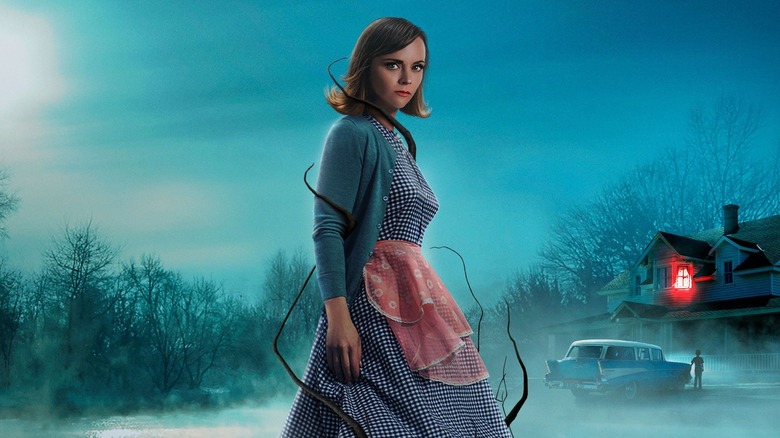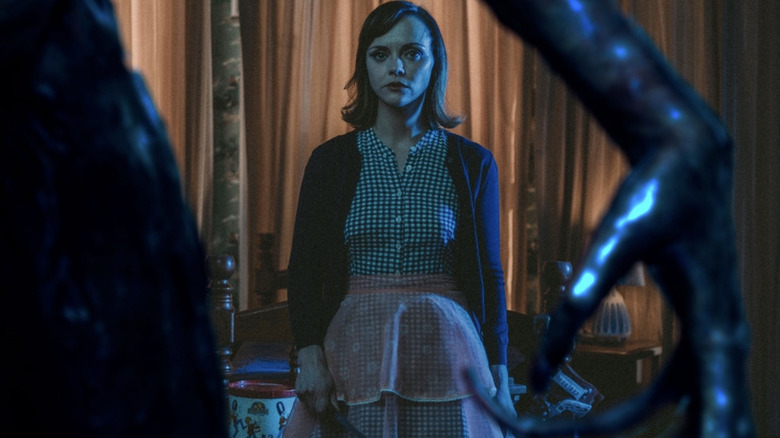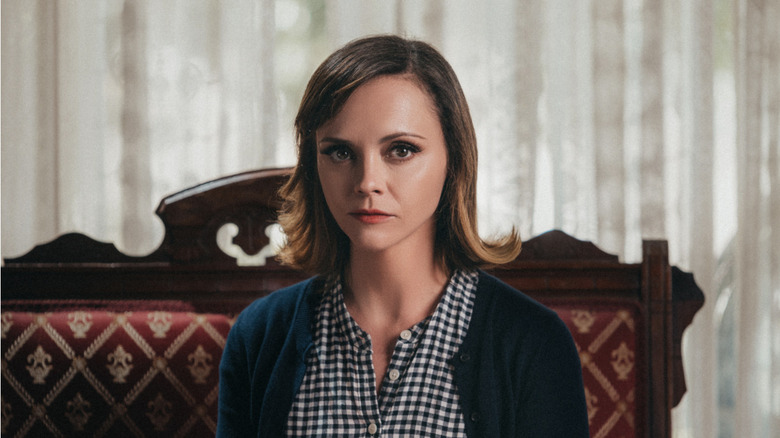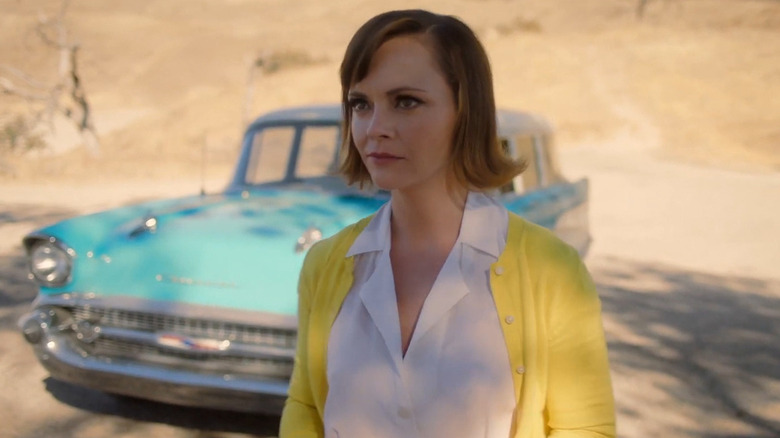Monstrous Review: Christina Ricci Struggles To Imbue Life Into Dull Thriller
The hybrid movie "Monstrous" suffers from an identity crisis; taking cues from the genres of horror, mystery, period-drama, and thriller, it fails to capture the spirit of any — making for a dull 90-minute viewing experience. It's a sobering lesson in how "less is more" when it comes to indie films.
"Monstrous" is, on a basic level, the story of a 1950s American housewife, Laura (Christina Ricci), fleeing her abusive husband with their seven-year-old son, Cody (Santino Barnard). They move to California and rent a beautiful farmhouse, furnished with the best and brightest the decade has to offer. Cody goes to school with other local children, while Laura takes a secretary job. Despite the seemingly idyllic surroundings, however, something isn't quite right in their new life. Cody struggles to fit in at school, and he and his mother are struggling to move on from what they left behind.
Oh, and there's a supernatural being in the nearby lake terrorizing them on a nightly basis.
All of this should be fine for a film made on a low budget. There are countless examples of horror films that got by on very few special effects — "Saw," "Paranormal Activity," etc. — and arguably, A24 and Blumhouse Productions have built their brands on delivering quality, low-cost indie horror films. "Monstrous" has the benefit of a recognizable star as its lead, and Ricci brings a lot of energy to the role. There's also a certain playfulness to the 1950s setting that is definitely underutilized in the horror genre, making this otherwise familiar story unique. "Monstrous" even received a pretty favorable review from Deadline when it premiered at the 2022 Glasgow Film Festival. All this adds up to so much potential for the film — potential "Monstrous" simply does not live up to.
The 1950s setting isn't exactly convincing
Directed by Chris Sivertson, "Monstrous" feels more rockabilly than retro: The colors are a bit too bright, Ricci's sweaters just a tad too tight, and the overall hue too vibrant. There's a disconnect between occasional dusty, hazy shots that evoke a sort of whimsical and nostalgic tone, and the high-definition super-crisp look of most of the movie. Credit where credit's due, the set dressings do look authentic — which is a nice touch — and there are some visually interesting shots used in the film; however, attention to detail is inconsistent throughout, and the few compelling visuals are not enough to make up for an overwhelmingly dull film.
The characters in "Monstrous" don't look, act, or talk like it's 1950s America — Cody doesn't behave like a typical kid you'd see in "Leave it to Beaver," "Lassie" or "Dennis the Menace," and the over-the-top "bitchy" landlady is laughably anachronistic. Ricci's own Laura is a bit too 2022, especially the hair (in the 1950s, it would have been caked in hairspray) but also her general demeanor. Overall, the vibe is just off; it never quite feels like authentic 1950s America, but it never quite feels like a throwback revisionist take either. Sivertson may have done this intentionally — this is a psychological thriller and it has a few major twists at the end — but that presents its own set of problems. It's difficult to feel immersed in a film that screams "cheap knockoff." A twist at the end needs to elevate the movie, not explain away its problems.
'Come on baby let's do the twist'
Sivertson directed "Monstrous" based on a screenplay penned by Carol Chrest. I'm always excited to see a woman working in the industry, especially a name I'm unfamiliar with; however, Chrest's inexperience shows here. The dialogue is forced and unnatural, events happen because the plot dictates it (rather than because that's the logical progression based on the characters' motivations), and the reveals don't pay off. You need to earn a big twist; M. Night Shyamalan may be a divisive filmmaker, but I'm sure most people agree that the twist in "The Sixth Sense" is both unexpected and extremely satisfying. The setup was clever — there are hints along the way, but not so obvious that it breaks the believability of the film preceding the reveal — and when the audience learns of the truth (along with Bruce Willis' Malcolm Crowe), it elevates the entire film.
This is not the case for "Monstrous" — although that was clearly what the director was aiming for here. The initial twist is abrupt, and while it explains some of the earlier events in the film, it also falls apart if you think about it at all (a bit like the fake movie "The 3" in "Adaptation"). To be fair, there is a lot that can be explained by the twist — but a movie shouldn't make you mentally write your own background story to fill major plot holes. Even taking the twist into account, so much of "Monstrous" simply doesn't make sense. There's a random flashback to Laura as a child with her grandmother, who tells her things were "simpler in [her] day" — it's such a weird, setting-breaking line. How old is Laura? How old is her grandmother? The first half of the 20th century was pretty difficult — I can't imagine a woman telling her grandchild things were easier during the depression or The Great War. (Nice male characters repeatedly refer to Laura as a "young woman" or a "pretty young thing," but Ricci is in her 40s — is Laura supposed to be in her 20s? Why are these lines even necessary?) Similarly, there are a few scenes where we see the action from Cody's perspective as he's approached by an entity from the lake — but if this is a psychological thriller, and we're supposed to be questioning Laura's state of mind, then showing another character seeing something supernatural completely undermines this.
Bluntly, Sivertson has no control over the audience in "Monstrous" and that is a major issue — especially for a film trying to do so many things all at once. A good thriller should thrill you. There needs to be tension, there needs to be a feeling of unease. A horror film needs to be scary. There needs to be frightening visuals and a feeling of threat from whatever antagonistic force is at play. A mystery should intrigue you. There needs to be a compelling question that the audience is trying to answer. All of these elements are missing from "Monstrous" — and despite how good of an actress Ricci is, she can't possibly compensate for the overall clunky execution. This is not a low-budget problem; this is a story and direction problem.
'If it Don't Feel Right'
The needle-drops in "Monstrous" only further the movie's problems with tone and setting. Presumably to evoke the feeling of "1950s," songs like "See You Later Alligator" by Bill Haley and Comets, "If It Don't Feel Right" by Waylon Jefferson James, and "I Don't Want to Set the World on Fire" by The Ink Spots are played over the action — but they're inappropriate for the scenes they're used in. For example, the fast-tempo, high-spirited "See You Later Alligator" is played in the first scene as Laura and Cody drive to their new home. A few scenes later, Laura reveals (via forced exposition dialogue) that they moved to escape her abusive husband. That makes the song choice at the beginning, and frankly that whole opening sequence, super weird. It's presented like a mother and her son going on a fun road trip: It's not treated as an emotionally difficult, a high-stakes moment; there's nothing to establish risk, danger, or any sort of threat. There's not even a hint of emotional trauma for the characters leaving their old lives behind. A different, diegetic song played over the car radio — like Patsy Cline's "I Fall To Pieces" or "Crazy" — would have been a much better choice for picking an era-appropriate hit song that also set up the idea that something's not quite right. (Really, scoring the whole movie with Patsy Cline would have been brilliant.)
Music used in a movie like this should either tell the audience what's going on and how to feel or offer an ironic twist. For example, "I Don't Want to Set the World on Fire" is featured prominently in the game "Fallout 3," and it is effective because the song embodies the retro feel of the game, while also making an ironic wink to the game's post-nuclear-apocalypse setting. In "Monstrous," that same song is played while Laura is sitting in her new home, presumably feeling a bit grim. At face value, the song is about unrequited love, which is not Laura's problem. There's nothing to indicate that Laura might be doing something destructive, so the ironic reading doesn't work either. Initially, I thought there might be some twist about her being in love with a woman (there's not) or that the movie was building up to some statement about the pressures of motherhood contrasted with the 1950s "ideal housewife" (it doesn't). I expected a possible reveal that she was the monster (she's not). The song choices, rather than building atmosphere and guiding the audience's expectations, actually detract from the movie.
There's a difference between intentionally misleading the audience and cleverly setting up, then subverting, expectations. Ultimately, "Monstrous" does the former, leaning far too heavily on expository dialogue that fundamentally contradicts everything the audience is seeing. It wastes its lead talent as well as its premise. I wanted to like the film; I was all set for a cheesy thriller that celebrated 1950s monster movies, had a strong feminist message, or was simply a pulp, trashy-in-a-good-way, fun ride. I don't care about the budget constraints; I can suspend my disbelief to ignore cheap-looking anachronistic costumes, or repeated use of a blue filter to pretend scenes filmed during a bright sunny day are actually happening at night (on a remote farm, with no light pollution for miles, where it would be pitch black outside). Sadly, even with my critical brain turned off, and my expectations very low, "Monstrous" was still a disappointment.
/Film Rating: 4 out of 10



